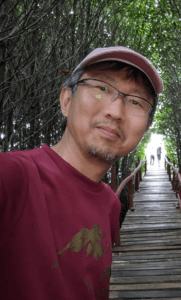Masters Programme, Department of Global Health
Tropical Medicine course (MTM)
ABOUT THE COURSE
The Nagasaki University Master of Tropical Medicine (MTM) is a one-year program designed for medical doctors seeking to advance their knowledge and clinical practice in tropical medicine and global health.
Established in 2006, the program is taught by experts from Japan and around the world. We welcome applications from doctors planning to work or conduct research in tropical or low resource settings, those interested in travel medicine, general practitioners, or anyone with a strong interest in this field.
A key feature of this course is the inclusion of the Diploma in Tropical Medicine and Hygiene (DTM&H), at no additional cost. The MTM goes beyond the diploma by offering training in epidemiology, statistics, research methods, and additional modules, along with a research project. Students may also have opportunities for clinical experience with partner institutions abroad, such as in the Philippines.
Graduates have pursued careers with international medical organisations (e.g., MSF), infectious diseases hospitals, travel clinics, and research institutions, with some continuing into PhD programs.
COURSE OVERVIEW
Duration
- One year (enrolled in October)
Academic degree conferred
- Master of Tropical Medicine
Location and semesters
- Lectures are held at the School of Tropical Medicine and Global Health, Nagasaki University.
- The major teaching periods are during Quarter 1 (October-December) and Quarter 3 (April-June).
- Quarter 2 (January-March) has optional modules, but can be also applied mainly to research project work including at an overseas research site.
- Quarter 4 (July-Septemeber) is mainly for finalizing research project and submission of dissertation. Dissertation defense is usually held in August.
Completion requirements
- 24 credits from compulsory modules
- 6 or more credits from elective modules
- Successful completion of a master’s dissertation (thesis)
CURRICULUM
Module topics include
- Epidemiology and Statistics (basic and advanced)
- Global Health
- Global Environment and Health
- Medical Microbiology I, II and III (virology, parasitology and bacteriology, respectively)
- Tropical Medicine I (basics of tropical medicine)
- Tropical Medicine II (laboratory techniques in tropical medicine)
- Clinical Tropical Medicine by Syndrome and Region)
- Medical Zoology
- Planetary Health
Please refer to the Curriculum list on the Curriculum (Master’s Programme) page for details of all compulsory and elective modules.
Professional Diploma of Tropical Medicine and Hygiene (DTM&H)
- Quarter 3 (April-June) includes compulsory modules and is combined with Diploma of Tropical Medicine and Hygiene course
- By completion of the compulsory modules for MTM and additional modules for DTM&H, MTM students can also obtain the title of DTM&H without additional payment for DTM&H course
Research project
- There are opportunities for students to conduct research projects in the Philippines, Vietnam, Nepal and other locations where tropical diseases are common
- San Lazaro Hospital in the Philippines has a joint research office and laboratory with Nagasaki University, where projects can be carried out
- Students may write their dissertation (thesis) using information they collect through this hands-on experience
Examples of previous students’ research projects
By graduates of 2025
| Dissertation title | Main supervisor |
|---|---|
| Tuberculous and nontuberculous mycobacteria among suspected tuberculosis patients in Metro Manila: prevalence and clinical characteristics | Prof. Christopher Smith |
| Pro-inflammatory and anti-inflammatory cytokines responses among active tuberculosis patients with and without Diabetes Mellitus in the Philippines | Prof. Koya Ariyoshi |
The list of other dissertation (thesis) titles
FEES
| Application fee | 30,000 JPY |
|---|---|
| Admission fee | 282,000 JPY |
| Annual tuition fee | 535,800 JPY |
- Annual tuition fee is to be paid at every half a year with 267,900 JPY.
- Master students who enroll in DTM&H course during Quarter 3 (April-June) will NOT be charged for DTM&H
APPLICATION
Application requirements
- Medical doctor’s license in any country
- Two or more years of clinical or corresponding experience
- Certificate of exam result of either of the following English exams taken on or after 1st January of two years before admission year
-
- IELTS Academic Module
- TOEIC Listening & Reading Test
- TOEFL
- TOEFL iBT
- Duolingo English Test
- *Applicants from English speaking countries or who completed a bachelor or master’s degree in English can be exempted from English exam
Please refer to the Application Guide for more detailes.
Application periods
| Eligibility |
|
|---|---|
| Application | Early January to mid January † |
| Entrance exam | Mid February † |
| Enrollment | October 1 |
| Eligibility |
|
|---|---|
| Application | Late March to mid April † |
| Entrance exam | Early May † |
| Enrollment | October 1 |
† Please refer to the Application Guide about the precise application periods and entrance exam dates of the forthcoming application deadlines
How to apply
Please carefully read the Application Guide and complete the required application forms.
NOTICE: Regarding ‘Screening for Entrance Requirements‘ written on the Application Guide PDF document, as the above Application requirements of MTM include medical doctors who should have a bachelor’s degree or higher, MTM applicants who fulfill the Application requirements can directly apply without the procedure of ‘Screening for Entrance Requirements‘.
MESSAGES FROM GRADUATES
Other messages from MTM graduates

 My first encounter to tropical medicine and global health was through my carrier in Quarantine Station in Japan (border measure against high consequence infectious diseases at international airports and seaports), which led me to Diploma of Tropical Medicine and Hygiene course at TMGH in 2021, followed by admission to Master of Tropical Medicine in 2022.
My first encounter to tropical medicine and global health was through my carrier in Quarantine Station in Japan (border measure against high consequence infectious diseases at international airports and seaports), which led me to Diploma of Tropical Medicine and Hygiene course at TMGH in 2021, followed by admission to Master of Tropical Medicine in 2022.